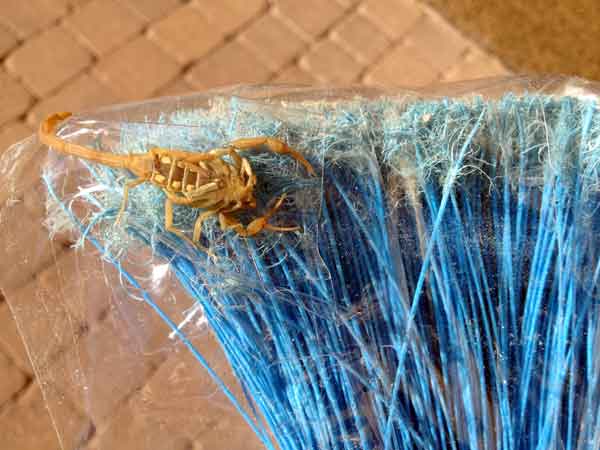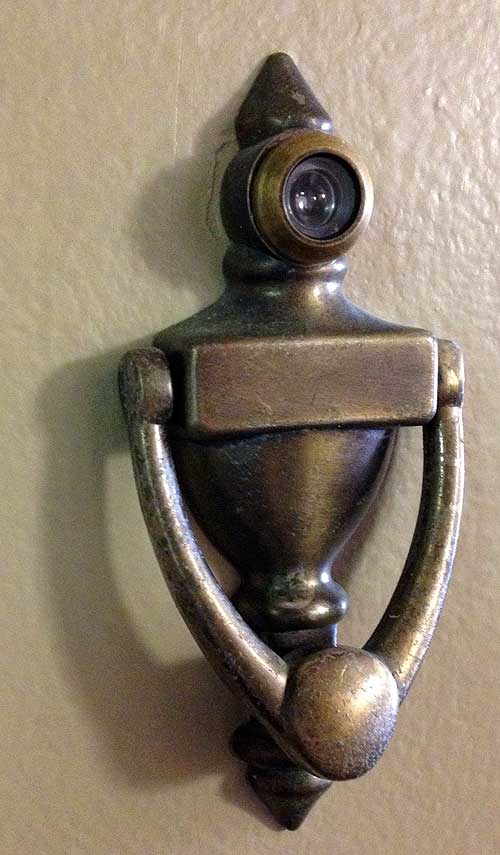How to kill scorpions
 You may want to know how to kill scorpions if you find them in your house, as I do. Or maybe not. I am not bugphobic, though I do prefer that multilegged creatures remain in their own territory—outdoors—and stay out of my house. But these things—well, my skin gets clammy just thinking about these prehistoric-looking monsters.
You may want to know how to kill scorpions if you find them in your house, as I do. Or maybe not. I am not bugphobic, though I do prefer that multilegged creatures remain in their own territory—outdoors—and stay out of my house. But these things—well, my skin gets clammy just thinking about these prehistoric-looking monsters.
Alas, I come across a scorpion intruder once or twice each month. I cannot allow them to stay. Neither can I capture and release, as I do with spiders. They must die. Sincere apologies if you’re a scorpion-as-pet aficionado. (But why?)
Though you can’t tell in the picture, the creature above blends into my stone floor. Here it is, injured, with an oozing wound on its back after a traditional slap with a slipper before I knew better. I went away a little shaken, this being my first encounter with a scorpion. When I returned, it was gone! It turned up three days later in my bedroom, expired.
How to kill scorpions
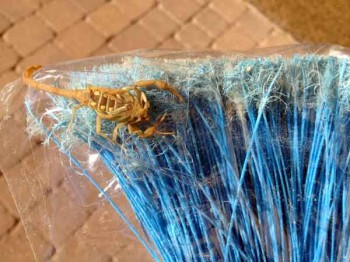
You can’t always just smash a rogue scorpion with a shoe. They get into corners and cracks and hard to reach places. With their hard exoskeletons, they’re impossible to smash on carpet. And who wants scorpion guts all over the place? My sister devised this foolproof method to kill scorpions. Necessity is the mother of invention, right?
Wrap tape around a broom, sticky side out. Make sure it’s secure. Now whack your intruder—the scorpion—and watch it stick, immobilized. It may wave its ugly tail a bit, or try to signal a truce with a pedipalp; but it’s not going anywhere. Fear not tight corners, door jambs, awkward spaces. The flexible broom bristles perform well in all instances. Bonus: distance between you and the arachnid.
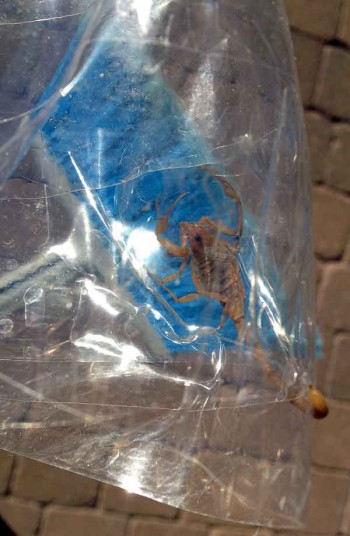
At this point, all you need is another length of tape. Sandwich the critter, slide the tape off the broom, and get rid of the evidence.
The weakness in this method is that you have to leave the scorpion to go make the scorpion-killer-broom. However, you never want to take your eyes off a scorpion in the house. If you come back and it’s gone, you might not sleep for a week. My sister’s solution: She kept two scorpion-killer brooms ready to go, in opposite ends of her house.
Eventually, my sister had her house scorpion-proofed. Expensive, but it worked. All vents, outlets, light-switches, and other openings were screened on the inside (behind the wall). Pocket doors were sealed—made permanently open or closed. I don’t know what other physical barriers were installed, but she never saw another scorpion.
For now, I’m sticking with the scorpion-killer broom. Good luck!
Fake jewelry doesn’t thwart pickpockets

Almost all of the opportunist pickpocket’s dirty work is preventable. I agree, it’s not practical to live in preparation for the worst at any moment. Bob and I say, practice safety as a habit. Stash your valuables wisely, and try not to send signals that you’re worth a thief’s effort. Other, easier targets will always be there to tempt the opportunist. Don’t make him even glance at you. We say, forget the flashy jewelry when you’re out and about.
Fake jewelry doesn’t thwart pickpockets
“But this is a fake Rolex,” some say smugly. “I paid $20 for it in Miami.” No comment on the purchase of counterfeit goods, but do you really want to be mugged for a fake Rolex? Do you believe a criminal can tell the difference? Not even in Naples, where Rolex-robbing is as common as running red lights, can a thief tell before he’s got it.
“These are CZs,” women tell me, tugging on glittery boulders in their earlobes. “It won’t break me if I lose them.” Listen: losing the earrings is not the point. You’re sending a signal to anyone who cares to pay attention: “Look at me! Notice my wealth!” The one who tunes in may or may not want those CZs; he may decide to linger and observe and find your Achilles’ heel, the chink in your armor. It’s not coincidence when a bag is snatched in the one moment you look away. You’ve been stalked. Why? You are attractive. You are wealth.
Yes, you’ll look like a tourist
If you are a tourist, chances are you look like one. That’s not a put-down. We can’t possibly look like a local wherever we are [despite all the “experts” exhorting us to]. We don’t dress, act, or sound like the natives, even within regions of the United States. I’ll never forget the time Bob and I came back to the States after six months in Sweden.

We flew straight to Orwigsburg, Pennsylvania, to do a private show. I had never felt like such an alien as I did in that town; and that thought had solidified long before a roadside breakfast at the “Family 3C’s” diner, where the perky little waitress asked “Where are you guys from?” with the unsaid ending: “space?” Was it because I asked for the definition of a “dippie,” a menu item with no description?
The big boss of our Orwigsburg client had described his employees, his “boys,” as backward and painfully shy. He said we’d think they seemed dumb, ignorant, but that they’re highly skilled at their individual jobs, good workers, loyal. At the party, Bob and I looked at all these beefy boys with their hefty wives, trying to figure out their lives and values. They didn’t look dumb; they looked innocent and close to the earth and less worldly than anyone we’d encountered in many years. Perhaps since we met the Masaai….
The event was held in a dismal lounge at a Quality Hotel. The pitiful effort at decorating (helium balloons rubbing against the low ceiling) matched the pathetic catering (macaroni salad, bbq chicken). This was the big party of their year! To be fair, I must add that the boss’s warmth and generosity toward them (and us) was impressive.
Culturally speaking, this was as fascinating an experience as any other exotic destination we’d visited. And on the positive side, we spoke the language. Somewhat, anyway. As always, I tried to pick up a little, so I can now order a “dippie” and expect an egg. But what would the Orwigsburgers think about being considered exotic, a fascinating study? I suspect we and the natives examined each other with the same dubious skepticism and sideways looks, like two isolated cats meeting for the first time.
Anyway, there we were in our own America and no doubt stuck out like two city-slickers in a dairy barn, similar to the time I showed up in Boyd, Texas for a show wearing New York black instead of dirty denim. Who knew? We didn’t mean to stand out—we just did.
The point is, most travelers can be seen as travelers, and a traveler is at a disadvantage. When we travel, we’re the foreigners. We’re outsiders, even if we don’t realize it. We don’t have street smarts, even if we do at home.
Dress down
Bob and I say, prepare yourself in advance. Travel light in order to travel confidently. Leave your shiny sparklers at home. On the road, lock up what you love. On your body, tuck them in. The idea is to enjoy your journey without worry.
Excerpt from Travel Advisory: How to Avoid Thefts, Cons, and Street Scams
Chapter Five: Rip-Offs: Introducing…The Opportunist
Police order civilians to arrest Mumbai pickpocket

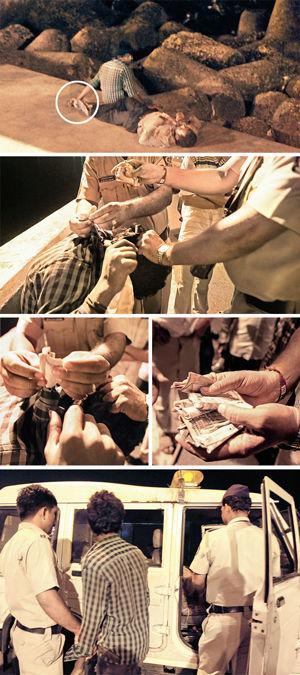
Our law enforcement friends in Mumbai do some creative police work. Methods that would never be tolerated in the U.S.
Okay, so they knew that a gang of pickpockets was targeting people on Marine Drive, the famous beach road. At 3 a.m. a week ago Thursday, a uniformed cop stood watching with a birds-eye view from a pedestrian overpass. Constable Bhaidas Chavana, the police officer, had his eye on a 16-year-old boy sitting beside a sleeping man.
Up on the overpass, Constable Chavan stopped a passerby who happened to be a photographer on a night assignment. Then he stopped a juvenile, also walking along. He enlisted the two civilians to run down to the beach road and nab the criminal! He ordered them to do it! One of them a child, the other presumably carrying expensive photography equipment! Can you imagine?
This must not be odd in Mumbai because the two citizens obeyed, trotting down to the beach as they were directed to, and grabbing the pickpocket. In the commotion, the victim woke up and confirmed that 500 rupees were gone. The pickpocket was searched—by the enlisted civilians—but they found no cash on him.
The Mumbai pickpocket
By then the constable arrived and his expertise proved itself. He turned up the thief’s shirt collar, felt for an opened seam, and from it withdrew the victim’s 500 rupees. Then he found a razor blade hidden in a slit seam of the pickpocket’s shirt cuff.
The pickpocket admitted that he’d dipped into the pockets of 16 other people in the area that night. Where then, was the rest of his loot? He also admitted to being a drug user. Perhaps he purchased drugs with the cash he stole earlier—weed was found in his pants pocket. Or he may have paid off a boss or a debt, or simply stashed his loot for safekeeping.
You can read a first-hand account by the photographer.

German menu
Grocery cart pickpocket

Would you feel threatened by the smiling face of this thief?
Grocery cart pickpocket
I’ve written about the grocery cart pickpocket before, but here’s a name and a face. Helps you realize just how virtuous and irreproachable a thief can look. This woman, Desha Wilkins, has a long record. She’s practiced. She’s calm—smooth—when she swoops in and snags stuff out of other women’s handbags—your handbag. You won’t feel nervous when she comes near; she’s just another woman shopping for groceries. You won’t clutch your purse closely, or swivel to stare.
This particular grocery cart pickpocket lives in District Heights, Maryland. She’s known to operate in surrounding areas as well as Montgomery County. Based on my interviews with other pickpockets, I’d bet that she travels, too. She might visit your neighborhood store. You might be there at the time. Oh, and she’s not the only one who preys on grocery store shoppers. Here’s a husband-and-wife thievery team who favor the shoppers at Whole Foods. And another. And more. Here’s the aftermath from a victim, an American woman in Paris.
Just a reminder: don’t leave your purse in your grocery store shopping cart. A theft takes only a second while you choose a ripe avocado or compare product labels. You won’t know your wallet or phone’s gone until you go to check out. Meanwhile. the grocery cart pickpocket will be long gone.
A certain brand of thief makes a career of this M.O. She stalks her marks and waits for the perfect opportunity. If you set your purse in the shopping cart, you will give her that perfect opportunity. Avoidance is simple: just keep your purse on your shoulder. Do not set it in the cart at all.
Baggage carousel ETA
Waiting at airport baggage carousels can be stressful. When will your bag come? Will your bag come?
Baggage carousel extra info
Copenhagen’s airport has these fantastic digital displays that tell you, not only on what carousel to find your luggage, but when it’s expected to arrive.
Need to pee? At least you know if you have time or not. You don’t want to desert your luggage spinning on the belt, no matter what airport you’re in.
In my experience, the posted luggage ETA was accurate. But even if it’s not, it’s nice to have an estimate and watch the countdown.
Devil’s Breath robbery/rape drug, aka burundanga

Devil’s Breath drug, aka burundanga
Hard to tell fact from fiction when researching “the world’s scariest drug” called Devil’s Breath, burundanga, and scopolamine. The second- and third-hand reports, of which there are many, seem to be well-intentioned warnings and FUD (fear, uncertainty, doubt).
The dosing methods and effects on the victims are duly terrifying. But what good is a warning if there is no possible way of protecting against the event? How can one prevent a stranger from blowing a bit of powder in one’s face? Or tainting a card or paper with the dust and showing it to the mark? “Excuse me, do you know this address/store/location?” —and you’re done for.
One thing is certain though. This 35-minute documentary about Devil’s Breath is fantastic, whether true or dramatized. The characters in it are all credible. The victims are believable and the perpetrators are colorful and convincing. Why would perps reveal the awful details of their criminal trade? Well, that doesn’t surprise me, given my experience making documentaries about thieves.
You probably know scopolamine as a drug for motion sickness. Perhaps you’ve worn the patch on a boat or ship. Although reports of criminal use of scopolamine are not new, and the video’s been around for a while, I’ve posted it here because I think the documentary is so good.
My friend Carolyn Hamilton, who lives in Ecuador, just mentioned that warnings of Devil’s Breath are swirling. Reports or rumors, I’m not sure. Carolyn photographed the brugmansia tree soon after moving to Ecuador, simply because of its beauty. Later, in a native plants class, she learned that “people plant it outside their bedroom windows so they will sleep better at night! Among the indigenous peoples it’s considered good luck to have one planted at your doorstep. And it’s known to be poisonous.” The photo above is from Carolyn’s neighbor’s yard.
Have any of you been drugged with Devil’s Breath? Have any of you heard a first-hand report from someone else who was drugged?
Edit 12/13/15: The New York Times just published an article, The Swindled Samaritan, which tells a first-person account of burundanga-drugging. The victim’s apartment was totally emptied by the drugger-thieves and the victim had no memory of the event. Her apartment lobby video showed her bringing the thieves in, and the doorman described how those thieves carried out her possessions.
Pickpocket payoff: rewarded for stealing wallet

Pickpocket payoff
“I think you have something of mine. I’m gonna give you a choice,” the victim said to the pickpocket. “You can give me my wallet and I’ll forgive you, and even pay for your groceries,” or she’d call police.
The red-faced, red-handed pickpocket handed back her wallet, and the victim, Jessica Eaves, from Guthrie, Oklahoma, paid $27 for his groceries.
She calls it compassion. I call it positive reinforcement of criminal behavior.
“What I did that day should be the norm,” Jessica said.
I’m not so sure about that. Poor and hungry are not acceptable excuses for theft. I’ve interviewed hundreds of pickpockets and they all have excuses and sob stories at the ready. They all readily hand over the loot when confronted. A little embarrassment is way better than another arrest. They’re criminals. They lie.
On the other hand, I know many people who struggle to make ends meet. Only a small fraction of them resort to thievery. Stealing is not a solution to out-of-money.
Jessica is naive. A pickpocket payoff made her feel like a savior, but most likely, the thief will go on to victimize others. That’s what pickpockets do. They live on the hard-earned cash of people who work for their money. They steal until they’re arrested, and then they’re out of business for a few days or weeks.
Take “JD,” an American pickpocket. He was well-bred, but fell in with the wrong people. When he learned how easy it was to take money, he couldn’t imagine working for it. “I had good schooling. I chose my negative role. My grandfather was a minister of a Baptist church. He built it from his hands up so I was brought up with Christianity. One of my brothers has been in the military over 27 years, he’s a technician.”
JD “works” a town for a couple of weeks, and when the police start to catch on, he moves on to another town. That’s his M.O.
And when he’s caught red-handed? “You just give it back; sometimes literally hand it back, depends on the situation. So many times I’ve handed people their money and their wallet right back to them, you know, to keep them from making a big commotion. ‘Hey, you got my wallet, you got my money.’ ‘Here, sir, excuse me.’ And just get away from them. And people, now that they got their property back, they don’t be too concerned about trying to hold you. So that’s your exit to get away.”
Perhaps the man who stole Jessica’s wallet was special. Maybe it was the first time he’d ever stolen. Hopefully, Jessica changed his life.
I have my doubts. I certainly believe in compassion. But I do not believe in rewarding criminal behavior. And that’s what Jessica Eaves did.
If the video doesn’t eventually show up below, please try refreshing the page. Or just click the link.
Hotel oddity #40 – Masterknocker – Radisson USC doorknocker
Radisson USC doorknocker
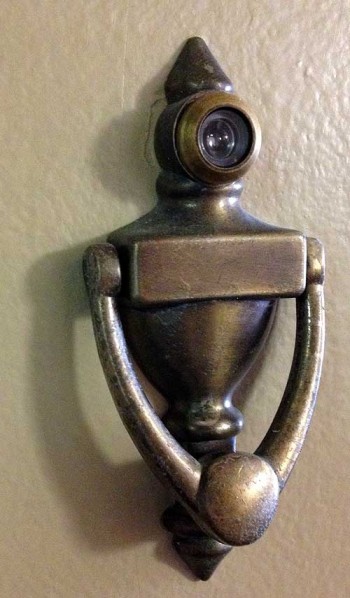
Masterknocker knock-off
University of California’s official hotel for the parents of its college students is run by Radisson Hotels. Each room door at USC’s Radisson Hotel has this handsome door knocker. I call it a masterknocker.
Knock fast, boys. Knock-off.



